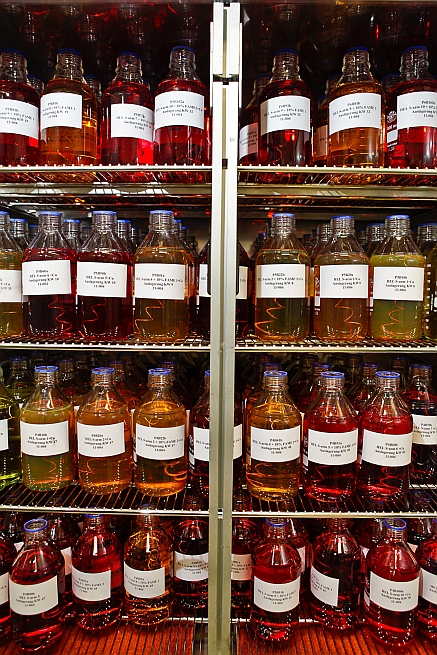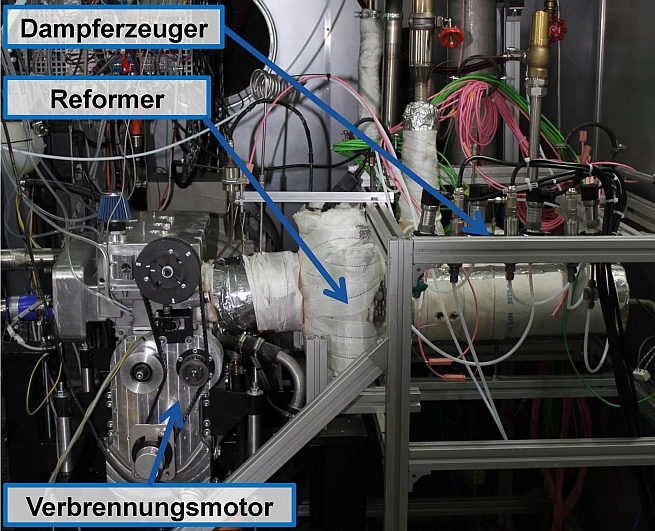Projects in the Research Cluster
The projects presented below have been combined in the Future Fuels research cluster. They are divided into the two areas “Modern technologies and combustion concepts” and “Use of greenhouse gas-reduced fuels”. Project profiles with a short description and information on terms, research partners, funding sources and research budgets can be found by clicking on the links.
Use of fuels with regenerative components in the mobility sector

Hardware-in-the-Loop-test rig fot the qualification of fuels. Photo: OWI
When alternative fuels are introduced to the market, testing their storage stability or aging behavior is just as important as examining their compatibility with the materials of the tank and the fuel supply system. This applies both to the effect of the fuel on metals and plastics used in vehicle construction. In research projects, OWI Science for Fuels gGmbH develops methods to investigate the compatibility of fuels with application technology. For example, OWI uses targeted aging methods to investigate the fuel aging and material compatibility of fuels and blends as well as the effect of potentially required fuel additives to prevent possible corrosion and swelling effects. The Research Institute uses chemical-physical analyses to test and evaluate aged fuel and material samples for potential changes. Loop concept tests supplement these investigations as required. In the test setup, fuels and various blends as well as additive admixtures flow through fuel-carrying components under forced and application-oriented conditions, so that ageing effects in real operation can be anticipated and evaluated in a relatively short time.
Robust and Efficient processes and technologies for drop in renewable FUELs for road transport (REDIFUEL)
The overall objective of REDIFUEL is the sustainable use of various biogenic raw materials to produce a renewable diesel biofuel that is compatible (drop-in capable) with conventional fuels in any blend ratio. (This requires new technologies and processes for the production of renewable fuels).
Closed-Carbon-Cycle-Mobility (C³-Mobility)
Options for various climate-neutral, electricity-based fuels are being studied in the “C³-Mobility” research project. (They are produced from CO2, water and electricity generated from renewable sources). A preliminary assessment has shown that the “methanol path” is well suited to meet the high demands on new fuels.
Sustainable mobility with synthetic fuels
In the project the sustainable production and use of synthetic fuels is being researched under ecological, economic and social criteria. The subject of the research are various fuel alternatives such as oxymethylene ether (OME) as diesel fuel and methyl formate (MeFo) and dimethyl carbonate (DMC) as petrol.
Standardization of alternative fuels
The necessary compatibility of new alternative CO2-reduced fuels and their blends with fossil components, materials and technical systems is the subject of the NormAKraft project. In this project, this includes the fulfilment of applicable regulations, in particular the conformity to standards according to DIN EN 228 or DIN EN 590 for petrol and diesel fuels as well as their classification in the existing national and international regulations.
Investigation of the technical basis for standardization of methanol fuels in Europe
The aim of the research project is to establish the technical basis for the standardisation of methanol fuels in Europe and thus pave the way for the certification and market introduction of methanol fuels. A number of technical requirements must be clarified along the way.
Lignin as raw material for marine fuels (IDEALFUEL)
In the EU-funded research project, an international consortium aims to develop new production methods for sustainable marine fuels to replace heavy fuel oils in shipping. The aim is to develop new, efficient and cost-effective methods of producing low-sulphur heavy fuel oils from wood-based non-food biomass to create sustainable alternatives.
Fuels for Plugin Hybrid Electrical Vehicles (PHEV)
Investigation of the interactions of fuels and fuel-carrying components in hybrid vehicles with fuel retention times of up to 6 months in the tank
Use of fuels with regenerative components in modern heating technologies

Samples of fuels are tested in climatic chambers for their long-term stability. Photo: OWI
Biogenic fuels show a different ageing behaviour than conventional fossil fuels. In order to elucidate the associated phenomena, OWI conducts, among other things, investigations on the avoidance of higher molecular aging products in middle distillates with biogenic components under application-related boundary conditions. The work is supplemented by the development of suitable test methods for the evaluation of the material resistance of components in middle distillate applications. These test methods can be further developed for practical applications such as rapid tests for heating components under application-related conditions.
Rapid test for heating components
Within the scope of the research project, a test method for the investigation of the resistance of relevant materials in fuel oil FAME, fuel oil HVO-FAME and diesel FAME blends is developed, which is suitable for an application at the component manufacturers.
Storage stability of middle distillates
The aging mechanisms that take place and previously unknown chemical and physical phenomena during storage will be investigated and broken down in detail using fuels consisting of FAME, HVO and fuel oil with high paraffinic contents.
Determination of fuel stability with sensors
OWI is looking for a cost-effective method to derive valid information on the long-term stability of liquid fuels with the help of sensors and suitable parameters.
Modern technologies and combustion concepts
SchIBZ – SchiffsIntegration Brennstoffzelle:

Integration of the hydrogen generator into the container with the fuel cell system. Photo: OWI
Development of a SOFC fuel cell generator for use on sea-going ships. Special feature: The hydrogen is produced from diesel fuel. SchIBZ is a beacon project of the National Hydrogen and Fuel Cell Technology Organization. Development work began in 2011 and was successfully completed in 2016 with the commissioning of a prototype. In the follow-up projects SchIBZ 2 (since 2017), work will continue. The aim is to operate the prototypes on board and to develop the components right up to industrial maturity.
Development of a fuel cell system based on diesel and natural gas as fuel
The project partners are developing two prototypes of practical fuel cell systems to technical maturity, which will generate environmentally friendly on-board power on passenger ships. The system is based on SOFC fuel cells, which can be operated with low-sulfur diesel fuel or liquefied natural gas (LNG) as energy source.
Production of hydrogen from liquid and gaseous fuels (reforming):

The reform gas engine in test operation on the test bench of ECC Automotive GmbH. Photo: OWI
This is an opportunity to use alternative and also very different new energy sources in existing efficiency technologies. During reforming, the fuels are broken down into the basic components hydrogen and carbon and the synthesis gas thus produced is fed into an energy conversion process, for example an internal combustion engine. The necessary processes and apparatuses (reformers) are developed in the research project “H2-Vario“. The focus here is on the use of liquid CO2-neutral energy sources. Two further projects are concerned with the use of waste heat from combustion exhaust gases from combined heat and power plants (CHPs) of small capacity by reforming processes. The aim is to increase the electrical efficiency of CHP units with biogas engines.
CHP uses renewable energy
A new EU research project will develop a novel small combined heat and power (CHP) engine that uses biomass to produce heat and electricity and could integrate renewable energy into the heating and cooling sector. The main innovation will be the use of rapid pyrolysis bio-oil from woody and non-woody biomass in a converted diesel engine.
Development of a process for the production of climate-neutral energy sources based on biogas
The aim of the research project is to produce high-purity methanol from sewage gas which can be marketed as a product. Based on an existing methanol synthesis plant, a demonstrator for an optimised methanol synthesis process will be developed.
Synthetic and BtL fuels as substitutes for heating oil
The project investigates the operational safety and durability of existing oil-fired heating systems when using synthetic or biogenic fuels. The aim is to find out to what extent already installed oil heating systems may need to be adapted for long-term operation with alternative liquid energy sources, or whether it is advisable to add fuel additives.
